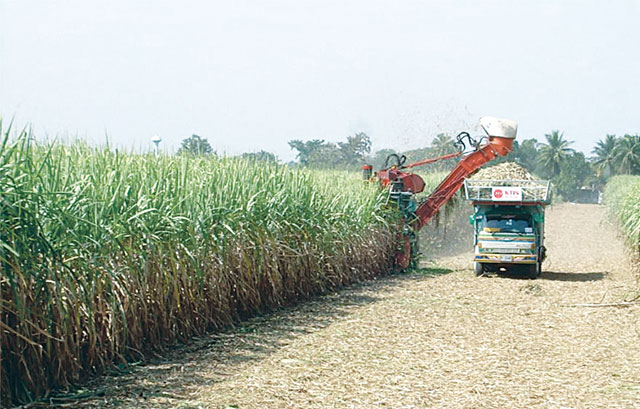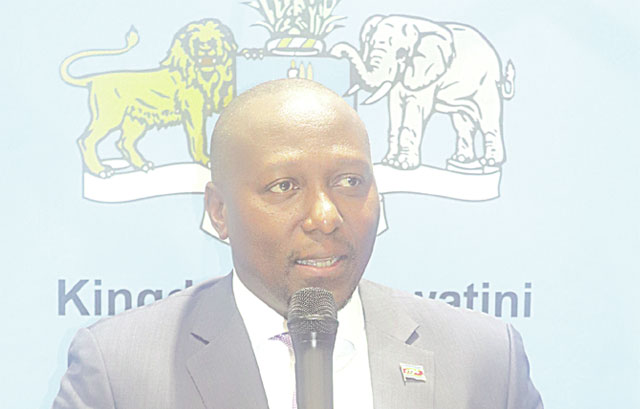By KWANELE DHLADHLA | 2021-03-01

Minister of Finance Neal Rijkenberg has disclosed that projections indicate a rebound in 2021. In the budget speech delivered on Friday, Rijkenberg mentioned that economic output is expected to recover from a low base and increase by 2.7 per cent.
However, Rijkenberg said elevated downside risks remain for the domestic economy.
“An anticipated second round effect on Southern African Customs Union (SACU) receipts due to the trade disruptions will further deteriorate government’s fiscal position and pose a risk to economic growth,” the minister disclosed.
Rijkenberg pointed out that the year 2020 has been a landmark year for the global economy. He said what began as a health crisis eventually grew into a global economic crisis.
The minister said the International Monetary Fund (IMF) expects global output to have contracted by 4.4 per cent in 2020, conditional on a significant decline in the spread of the pandemic in 2021, estimates project a rebound from this low base to 5.2 per cent growth.
“The observed resurgence of coronavirus infections, the severe second wave and additional lockdowns in most countries, pose serious risks to the outlook,” said Rijkenberg.
The IMF forecast Sub-Saharan Africa’s economic activity to contract by 3.0 per cent compared with a pre-pandemic forecast of 3.6 per cent growth. South Africa’s economy grew by a mere 0.2 per cent in 2019 as a result of the labour strikes, energy supply disruptions and weak agricultural production.
In 2020, as a consequence of the pandemic, the IMF revised South Africa’s growth from a positive 1.1 per cent to a negative 7.2 per cent. Nevertheless, towards the end of 2021, growth is anticipated to rebound to 3.3 per cent.
Rijkenberg said the Central Bank of Eswatini’s (CBE) monetary policy stance was both accommodative and stable throughout the year of 2020.
He explained that the main objective had been to provide a supportive environment for the economy amid the devastating impact of the coronavirus pandemic.
It should be mentioned that Rijkenberg tabled a reduced E24 billion fiscal consolidation budget in light of the COVID-19 pandemic that continues to wreak havoc globally and in the country in particular. He said the total expenditure for 2021/22 would witness a minimal decrease of 0.12 per cent compared to last year’s budget that amounted to E24.07 billion.
Expenditure The minister disclosed that the total expenditure for the financial year is expected to be E24.04 billion.
This, he said, would include public debt payments of E3.2 billion while the appropriated recurrent expenditure has been set to be E16 billion, a decrease of 3.2 per cent compared to the previous year.
The minister further announced an unchanged total budget allocation to capital programmes that amounts to E6.37 billion just like the last financial year. The budget deficit, on the other hand, has been projected at 6.5 per cent of GDP, which is equal to E4.6 billion.
Taking the lion’s share in this year’s budget is the ministry of education and training at about E3.4 billion and is followed by the ministry of health at about E2.4 billion.
About E2.7 billion has been allocated to the three security forces, defense (E1 184 242), the police (1 029 994) and Correctional Services (E512 761 000).
It should also be noted that a number of projects have been deferred to cater for the current situation.
The minister stressed that priority will be given to procurement of goods and services for health, including PPE, drugs and medical supplies; education; disaster relief and social services.
In pursuit of the Eswatini Strategic Roadmap, he said government will explore the possibility of introducing an electronic procurement system, which will interface with the integrated financial management system.
He said this follows an assessment of government’s readiness in terms of the hardware necessary to run the system.
Support
“The World Bank is providing technical support in the preparatory work and procurement of suitable software. The relevant stakeholders will be assisted through the transition to electronic procurement through sensitisation and capacity building to ensure that they are not disadvantaged by the new system,” he pointed out.
The minister also highlighted that government revenue including grants in the 2021/22 fiscal year was projected to reach E19.45 billion, which was 27.5 per cent of GDP.
Of this, he said, grants were approximately E411 million. He said SACU receipts had declined from E8.35 billion in 2020/21 to E6.38 billion in 2021/22 while non-SACU revenue will stand at E12.66 billion.
“Mr. Speaker, the projected estimates of revenue assume that the pandemic and its devastating impact on the economy will be mitigated prior to the end of the financial year. Total income taxes are projected to increase to about E6.34 billion in 2021/22.
Corporate income taxes are expected to be E1.86 billion in 2021/22. Similarly, personal income taxes are expected to be E3.89 billion. Taxes on goods and services excluding SACU receipts are expected to be E5.79 billion.
VAT is expected to be E3.96 billion. Fuel tax is expected to be E1.55 billion. The levy on imported vehicles is projected to grow around 100 per cent, from E9.9 million to E20 million,” he added.
share story
Post Your Comments Below

OVER 50 young people attended the life-changing seminar hosted by Semusa Networks on Saturday.

The United States Department of Agriculture (USDA) Post in Eswatini paints a positive picture for...

Prime Minister, Russell Dlamini, has maintained that government jobs are not a privilege, saying ...

SOCCER - ARE they a target for being trendsetters?
Following the movie-like scene, where ...
All material © Swazi Observer. Material may not be published or reproduced in any form without prior written permission.
Design by Real Image Internet